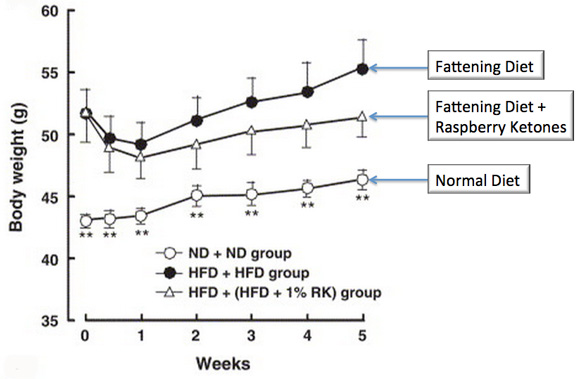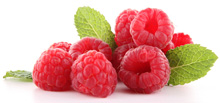If you need to lose weight, you are not alone. More than a third of Americans are overweight, and another third are obese.

Women Holding Raspberries in Her Hand
Only 30% of people are now at a healthy weight… being overweight has become the new “normal.”
The problem is, conventional weight loss methods are so difficult that 85% of people fail in the long run.
However… there are many products out there that are claimed to make things easier.
These are herbs, shakes and pills that are supposed to help you burn fat or reduce your appetite.
Among the most popular ones is a supplement called Raspberry ketones.
Raspberry ketones are claimed to cause the fat within cells to be broken down more effectively, helping the body burn fat faster. They are also claimed to increase levels of adiponectin, a hormone that helps to regulate metabolism.
This article reviews the current scientific research behind raspberry ketone supplements and whether they are actually worth considering.
Raspberry ketone is a natural substance that gives red raspberries their powerful aroma.
This substance is also found in small amounts in blackberries, cranberries and kiwis.
It has a long history of use in cosmetics and has been added to soft drinks, ice cream and other processed foods as a flavorant.
Actually… most people are already eating small amounts of raspberry ketones, either from the fruits themselves or because of their popularity as a flavorant.
Only recently did they became popular as a weight loss supplement.
Even though the word “raspberry” may appeal to people, the supplement is actually NOT derived from raspberries.
Extracting raspberry ketones from raspberries is insanely expensive, because you need 90 pounds (41 kg) of raspberries to get the amount needed for a single dose!
In fact, a kilogram (2.2 pounds) of whole raspberries only contains 1-4 mg of raspberry ketones. That’s 0.0001-0.0004% of the total weight.
The raspberry ketones you find in supplements are synthetically made via an industrial process and are not natural.
Another reason for the appeal of this product is the word “ketone” – which associates it with low-carbohydrate diets, which force the body to burn fat and elevate blood levels of “ketones.”
However, raspberry ketones have absolutely nothing to do with low-carbs diets and will not have the same effects on your body.
Bottom Line: Raspberry ketone is the compound that gives raspberries their strong aroma and flavor. A synthetic version of it is used in cosmetics, processed foods and weight loss supplements.
Researchers became interested in raspberry ketones because of the molecular structure.

Women holding a bowl of raspberries
They noticed that it looked very similar to two other molecules, capsaicin (found in chili pepper) and synephrine (a stimulant).
Several studies have shown that these two molecules can boost metabolism, so it was speculated that raspberry ketones could have the same effect.
When researchers took isolated fat cells from rats and made them grow in a test tube, adding raspberry ketones to the mix had two effects:
Adiponectin is a hormone that is released by fat cells and is believed to play a role in regulating metabolism and blood sugar levels.
Thin people have much higher levels of adiponectin than people who are overweight and the levels of the hormone increase when people lose weight.
Studies have shown that people with low adiponectin levels are at a higher risk of obesity, type 2 diabetes, fatty liver and even heart disease.
Therefore, it stands to reason that raising adiponectin levels with natural means could help people lose weight and lower the risk of many diseases.
However… even if raspberry ketones raise adiponectin in isolated fat cells from rats, this does NOT mean that the same will happen in a living, breathing organism.
Also keep in mind that there are natural ways to increase adiponectin. For example, exercise can increase adiponectin levels by 260% in as little as one week. Drinking coffee is also linked to higher levels.
Bottom Line: Raspberry ketones have a similar molecular structure as two known fat burning compounds. They can make isolated fat cells break down fat and release a hormone called adiponectin.
Raspberry ketone supplements have shown some promise in studies on mice and rats.
However, the results weren’t nearly as impressive as the supplement makers would have you believe.
In one of the studies, a bunch of mice were fed an unhealthy, fattening diet. Some of the mice got raspberry ketones… others did not.
This is what happened:

Keep in mind that the rats in that study did NOT lose weight, they just gained less than expected.
Another study was conducted in 40 rats, also fed a fattening diet. In this study, the rats given raspberry ketones had increased adiponectin levels and were protected against fatty liver.
However… I don’t think you should get your hopes up though, because these were massive dosages.
You would have to take a 100 times the recommended amount in order to reach the same dose as the test animals (NOT recommended).
Bottom Line: Some studies in mice and rats show that raspberry ketones can protect against weight gain and fatty liver. However, these studies used massive dosages, much higher than you would get with supplementation.

A Pile of Raspberries
Unfortunately, there is not a single study on raspberry ketones in humans.
The only human study that comes close used a combination of substances, including caffeine, raspberry ketones, garlic, capsaicin, ginger and synephrine.
In this 8 week study, the participants lost 7.8% of their fat mass, compared with the placebo group which lost only 2.8% (both groups also cut calories and exercised).
However, it is highly possible that the raspberry ketones had nothing to do with it. It could have been the caffeine or any of the other herbs.
Really… I looked long and hard and I am 100% certain that there isn’t ANY actual evidence showing that this supplement can work in humans.
From looking on forums and reviews online, the pattern seems similar to other weight loss supplements. Some people lose weight, others don’t, and some people even gain weight while taking the supplement.
It’s important to keep in mind that just because someone on TV or someone you know lost weight with raspberry ketones, it does NOT mean that the supplement had anything to do with it.
Even when people lose, chances are that it is just a placebo effect.
Many studies show that placebo (a dummy pill) can have an effect on people.
Maybe they want the pills to work, so they start weighing themselves more often, eating more mindfully, feeling more motivated to exercise, etc.
Therefore, it could just be these behaviors that caused the people to lose weight, not the supplement itself.
Of course, it is still possible that raspberry ketones DO work, that it just hasn’t been proven yet… but given how incredibly large the dosages need to be to see an effect, then I personally think this is unlikely.
Bottom Line: There is currently no evidence that raspberry ketone supplements can cause weight loss in humans.

One study has shown that raspberry ketones can have cosmetic benefits.
When administered topically, as part of a cream, it has been shown to increase hair growth in people with hair loss, as well as improve skin elasticity in healthy women.
However, this study was small and had a number of flaws, so it should not be used as evidence of anything.
Bottom Line: One small study shows that raspberry ketones, when administered topically, can increase hair growth and improve skin elasticity.
Because they haven’t been studied in humans, there is no data about potential side effects.

Woman Skeptical About Taking a Pill
However, as a food additive, raspberry ketones are categorized as “Generally Recognized as Safe” (GRAS) by the FDA.
Keep in mind that the FDA also puts high fructose corn syrup and soybean oil in the same category, so take that with a big grain of salt.
Looking online, there have been some anecdotal reports of jitteriness, rapid heartbeat and increased blood pressure, but this could have been a coincidence.
The mouse and rat studies used massive dosages and no harmful effects were noted, so it seems to be safe in test animals.
Due to the lack of human studies, there is no science-backed recommended dosage.
The recommendations on different raspberry ketone supplements range from 100 mg to 400 mg, 1 to 2 times per day.
Bottom Line: Because there are no human studies, there is no good data on side effects or a science-backed recommended dosage.